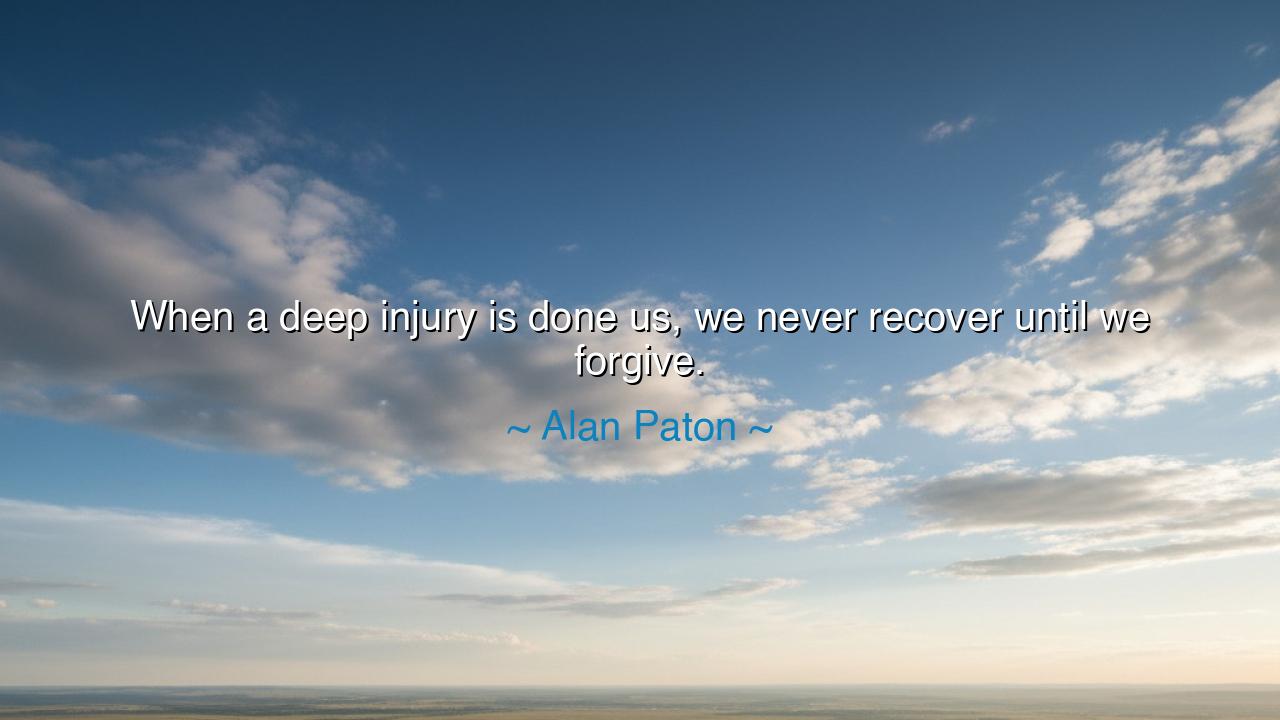
When a deep injury is done us, we never recover until we forgive.






Host: The room was quiet, the soft light from the lamp casting a peaceful glow across the space. Jack sat near the window, his fingers lightly tapping on the armrest, his thoughts clearly focused on something deeper. Jeeny, across from him, was curled up in her chair, a cup of tea in her hands, her gaze soft and reflective. The stillness between them felt like a space waiting to be filled with understanding, as though they both knew the conversation ahead would touch on something important.
Host: Alan Paton’s words broke the silence: “When a deep injury is done us, we never recover until we forgive.” The simplicity and depth of the statement seemed to carry a powerful truth about healing, forgiveness, and the human experience of wounds. Jack, who often thought about things from a more practical perspective, was the first to speak.
Jack: His voice was reflective, almost solemn: “I understand that. The idea that forgiveness is the key to healing—not just for the other person, but for ourselves. When we’ve been hurt, when someone has done something to us that feels unjust or deep, it’s so easy to hold onto that pain, to let it define us. But Paton’s saying that healing doesn’t come until we let go of that anger, that resentment, and allow forgiveness to take its place.”
Jeeny: She nodded slowly, her voice gentle, but filled with empathy: “Exactly. Forgiveness isn’t about excusing the wrong, but about releasing its grip on us. When we hold onto anger or hurt, we carry it with us, and it weighs us down. Forgiveness isn’t something we do for the other person—it’s something we do for ourselves, to free ourselves from the pain and the bitterness that keeps us from moving forward.”
Host: The conversation seemed to grow a little heavier, as if Paton’s words had opened up a deeper truth about the nature of healing. It wasn’t just about letting go of the past—it was about taking back control of our emotional well-being, about choosing to release the things that have hurt us. Jack, who often focused on logic and reason, seemed to soften, reflecting on how much of the pain we experience is tied to our inability to forgive.
Jack: His voice grew softer, almost reflective, as he continued: “Maybe that’s what makes forgiveness so powerful—it’s not just a release of anger, but a shift in how we see the situation. It’s like saying, ‘I’m no longer going to let this define me. I’m going to choose to heal, to move forward.’ That doesn’t mean we forget—it means we stop letting the injury control our lives.”
Jeeny: Her expression softened, her smile reassuring, as she spoke: “Exactly. It’s not about pretending the hurt didn’t happen. It’s about choosing to move past it, to no longer allow it to hold us back. Forgiveness doesn’t mean we’re weak or letting someone off the hook—it means we’re taking the power back and refusing to let the injury have a hold on us any longer. It’s a step toward freedom.”
Host: The room seemed to grow a little still, as if the conversation had uncovered something deeply important about the nature of forgiveness. The idea that we cannot truly recover from deep wounds until we let go of the need for retribution, until we make the choice to forgive, felt like a sobering truth. Jack and Jeeny sat in that quiet understanding, realizing that true healing begins not with the other person’s actions, but with our own willingness to forgive.
Jack: His voice was calmer, almost resolved, as he reflected: “Maybe that’s the core of it—releasing ourselves from the weight of the injury. It’s not about the other person deserving forgiveness; it’s about us choosing to be free from the pain. It’s the only way to truly move forward.”
Jeeny: She nodded, her voice gentle but filled with deep understanding: “Exactly. Forgiveness is the key to freedom, to healing. And sometimes, the hardest part is not forgiving the other person—it’s forgiving ourselves for holding on to the hurt for so long.”
Host: The evening continued, but the world outside felt distant. Inside, Jack and Jeeny sat in the quiet realization that healing comes not from forgetting or denying the pain, but from the choice to forgive, to let go, and to move forward. They understood now that forgiveness was not just an act of kindness for others, but a powerful step toward reclaiming peace and freedom for themselves.






AAdministratorAdministrator
Welcome, honored guests. Please leave a comment, we will respond soon